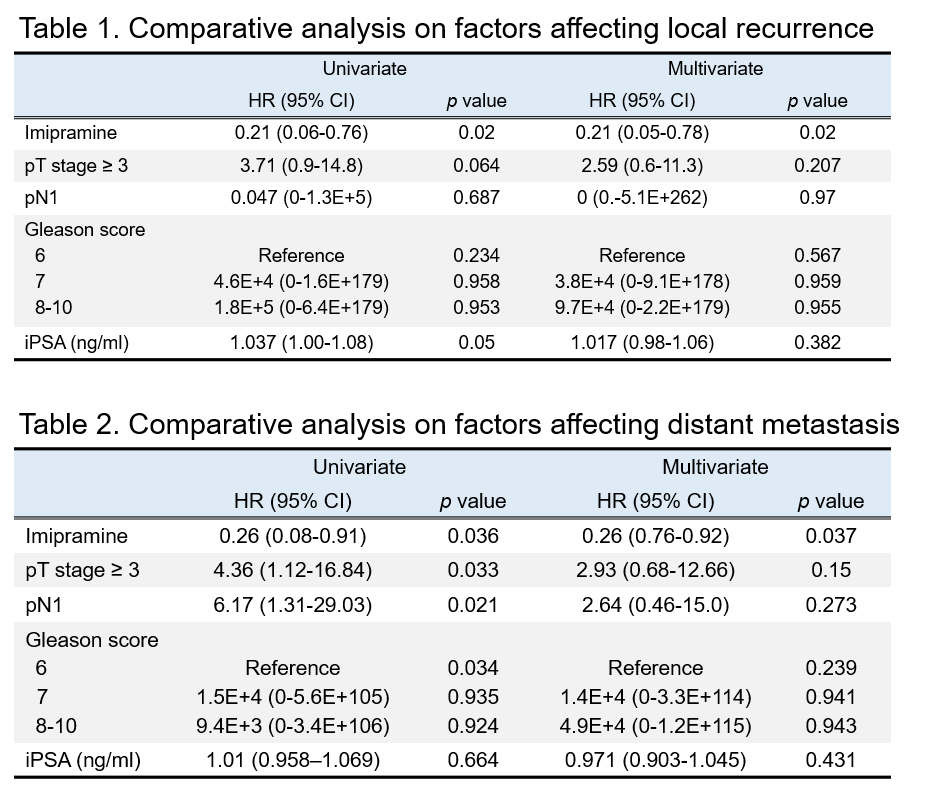Back
Poster, Podium & Video Sessions
Moderated Poster
MP15: Prostate Cancer: Localized: Surgical Therapy I
MP15-07: Imipramine delays clinical progression of prostate cancer
Friday, May 13, 2022
2:45 PM – 4:00 PM
Location: Room 222
Seung-hwan Jeong*, Jang Hee Han, Hyeong-Dong Yuk, Chang-Wook Jeong, Hyeon-Hoe Kim, Ja-Hyeon Ku, Cheol Kwak, Seoul, Korea, Republic of
- SJ
Poster Presenter(s)
Introduction: Imipramine is a tricyclic antidepressant which has been known to improve stress incontinence after radical prostatectomy (RP) by increasing norepinephrine and serotonin levels while promoting anticholinergic signaling and relaxing muscles of urinary bladder. Although several preclinical data have shown that imipramine could prevent prostate cancer progression by inhibiting migration and invasion, it has not been evaluated on clinical data.
Methods: Patients enrolled in prospective cohort clinical database, Seoul National University Prospective Enrolled Registry for Prostate Cancer (SUPER-PC), between March 2016 and December 2019 were queried. In total of 1989 cases, 239 imipramine-naïve cases were matched with 1256 imipramine-treatment cases which received imipramine more than 3 months using propensity score on age, initial PSA and pathologic stages. Biochemical recurrence (BCR), clinically proven local recurrence and distant metastasis were thoroughly evaluated with Cox proportional hazards regression model.
Results: Through propensity score matching 211 imipramine-naïve cases were matched with 783 imipramine-treatment cases. Demographic characteristics including ASA score, hypertension and diabetes were similar in these two groups despite average age of imipramine-treatment cases was slightly higher (66.0 vs 67.9, p < 0.001). Unfavorable pathologic T (over T3, 33.2% vs 35.6%, p = 0.507) and N (N1, 5.2% vs 3.6%, p = 0.277) stages was similar between two groups, but Gleason scores (GS) of 7 were more prevalent in imipramine-treatment cases (GS 6/7/8-10, 18.5/73.5/8.1% vs 11.4/83.3/5.4%, p = 0.005). Imipramine-treatment cases did not benefit in recovery of continence after 12 months of RP (98.6% vs 96.9%, p = 0.192) and in BCR (HR 0.96, 95% CI 0.66-1.38) in multivariate analysis. However local recurrence (HR 0.21, 95% CI 0.05-0.78) and distant metastasis (HR 0.26, 95% CI 0.76-0.92) were significantly delayed in imipramine-treatment cases in multivariate analysis.
Conclusions: It is not uncertain whether imipramine contributes to recovery of continence after RP. However, imipramine suppresses clinical progression of prostate cancer by delaying local recurrence and distant metastasis after RP in well-matched analysis from prospective cohort dataset.
Source of Funding: This research was supported by a Basic Science Research Program through National Research Foundation of Korea (NRF), funded by the Ministry of Education (NRF-2018R1D1A1B07041191) and by Seoul National University Hospital (0320210060).

Methods: Patients enrolled in prospective cohort clinical database, Seoul National University Prospective Enrolled Registry for Prostate Cancer (SUPER-PC), between March 2016 and December 2019 were queried. In total of 1989 cases, 239 imipramine-naïve cases were matched with 1256 imipramine-treatment cases which received imipramine more than 3 months using propensity score on age, initial PSA and pathologic stages. Biochemical recurrence (BCR), clinically proven local recurrence and distant metastasis were thoroughly evaluated with Cox proportional hazards regression model.
Results: Through propensity score matching 211 imipramine-naïve cases were matched with 783 imipramine-treatment cases. Demographic characteristics including ASA score, hypertension and diabetes were similar in these two groups despite average age of imipramine-treatment cases was slightly higher (66.0 vs 67.9, p < 0.001). Unfavorable pathologic T (over T3, 33.2% vs 35.6%, p = 0.507) and N (N1, 5.2% vs 3.6%, p = 0.277) stages was similar between two groups, but Gleason scores (GS) of 7 were more prevalent in imipramine-treatment cases (GS 6/7/8-10, 18.5/73.5/8.1% vs 11.4/83.3/5.4%, p = 0.005). Imipramine-treatment cases did not benefit in recovery of continence after 12 months of RP (98.6% vs 96.9%, p = 0.192) and in BCR (HR 0.96, 95% CI 0.66-1.38) in multivariate analysis. However local recurrence (HR 0.21, 95% CI 0.05-0.78) and distant metastasis (HR 0.26, 95% CI 0.76-0.92) were significantly delayed in imipramine-treatment cases in multivariate analysis.
Conclusions: It is not uncertain whether imipramine contributes to recovery of continence after RP. However, imipramine suppresses clinical progression of prostate cancer by delaying local recurrence and distant metastasis after RP in well-matched analysis from prospective cohort dataset.
Source of Funding: This research was supported by a Basic Science Research Program through National Research Foundation of Korea (NRF), funded by the Ministry of Education (NRF-2018R1D1A1B07041191) and by Seoul National University Hospital (0320210060).


.jpg)
.jpg)